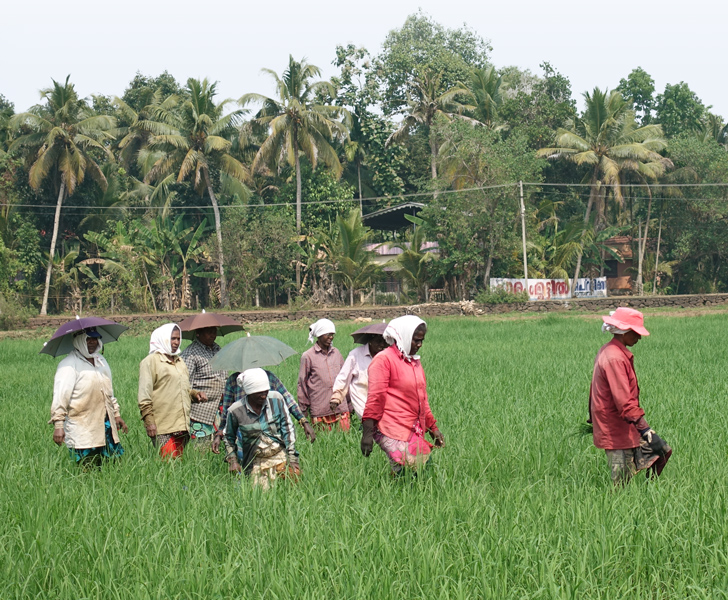Making green Kerala greener Read about RI District 3211’s path-breaking REAP project, where Rotarians are not only involved in growing traditional varieties of healthy rice, but where club meetings, frequently held in lush green paddy fields, become a celebration of nature’s beauty and bounty.
For those of us who are huge fans of the clean and green Kerala and grab the first opportunity to holiday in this nature-friendly State, it will come as a surprise to know that DG Suresh Mathew of RI District 3211 has undertaken an initiative to make the already green Kerala even greener.

Pithily named REAP (Rotary Empowerment of Agricultural Production), the aim of this project is manifold, primary one being to grow a traditional variety of Kerala rice through natural and organic farming, with no chemical fertilisers or pesticides. Well-planned before Mathew took over as DG, and launched on July 1, REAP has the ambitious objective of infusing the State’s fallow land, destroyed over the years through chemical pesticides, with bio-nutrients and producing healthy crops — mainly paddy.
Thanks to the enthusiasm with which 3211’s clubs have jumped in, in the last seven months over 250 acres of fallow paddy fields have been rejuvenated, and already over 250 metric tonnes of organically grown rice has been harvested. About 60 per cent of this leased land is under paddy cultivation; the rest being banana, tapioca and vegetables.
“The rice we grow is healthy and delicious, and has become very popular among Rotarians,” smiles Mathew.
The genesis
Agricultural data shows that due to better employment prospects overseas, over the years, tens of thousands of Keralites left for foreign lands, particularly Gulf countries, and the farmland used for paddy cultivation by many families was abandoned. Also, the continuous use of chemical fertilisers had destroyed nutrients in the soil and there wasn’t much charm left in growing rice. Add to this the shortage of labour with the Gulf beckoning, agriculture took a big blow.
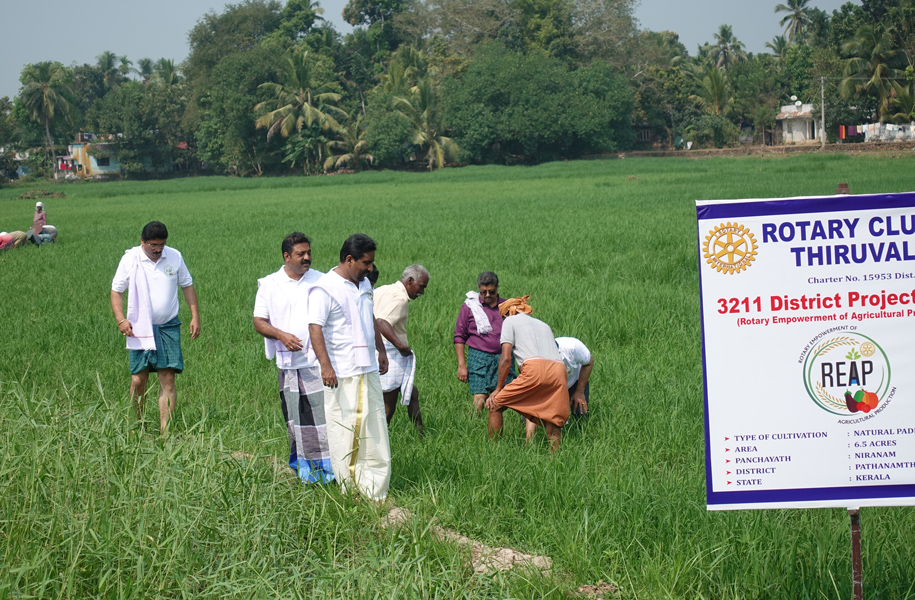
“The result is that people of Kerala have become dependent on rice, most of it infested with chemicals and pesticides, imported from Andhra Pradesh and other States. DG Mathew learnt from oncologists and other health experts that this is one of the many causes for the rise in the incidence of cancer in Kerala,” says Bijumon Kurien, an exporter of organically grown food and chairman of REAP.
Another architect of the project and its chief advisor, PDG K P Ramachandran, who helps Mathew and Kurien to implement this scheme, provides another startling statistic. He says that in 1966, there were around eight lakh hectares of land under paddy cultivation in Kerala, “but that has now shrunk to only two lakh hectares. Around six lakh hectares have gone away to rubber plantation and other activities and a major portion of that land is sitting idle.” The result, he estimates, is that around 85 per cent of rice consumed by people in Kerala comes from outside, mainly Andhra and “it is infused with a lot of chemicals. Kurien is an expert in bio-cultivation and that is why DG Mathew chose him to chair this project,” he says.
So when REAP was being planned, it was also decided to make it as inclusive as possible by roping in more people from the community into the initiative to grow healthy food through natural and organic methods. It was decided that Rotarians in the district would give out one lakh ‘grow bags’ with vegetable saplings for kitchen gardens. “The idea was to get people interested in farming. Everybody doesn’t have farmland, but we all can grow vegetables in our homes,” says Mathew.
Kurien contacted the GoI’s Coir Board, and discussed the use of giving out grow bags filled with cocopeat to make it much easier for the women to handle the much lighter bags. “They provided us cocopeat enriched with manure and other nutrients and many clubs have given out 1,000 or more such bags with the Rotary logo and name in their communities,” he says.
Many pilot projects were done and this initiative attracted the attention of the media in a big way; “we made videos and a manual in Malayalam explaining the methodology and advantages of organic farming — both through grow bags and rice cultivation through natural farming in fallow land,” says Kurien.
Involving community
The approach, says Mathew, is to involve as many stakeholders as possible. Various Rotary clubs started leasing fallow land in their region — the average cost is around ₹12,000 per acre. The soil was enriched with bio-organisms and organic manure and traditional seed varieties were acquired from local experts. By the time Mathew’s year as DG had begun, the REAP team was ready to officially launch the project, at as prominent and visible a place as the State Secretariat in Thiruvananthapuram. “We distributed 1,000 Rotary grow bags; the Agricultural Minister V S Sunil Kumar and some other ministers, and several MLAs and bureaucrats participated and it got high visibility,” says the DG.
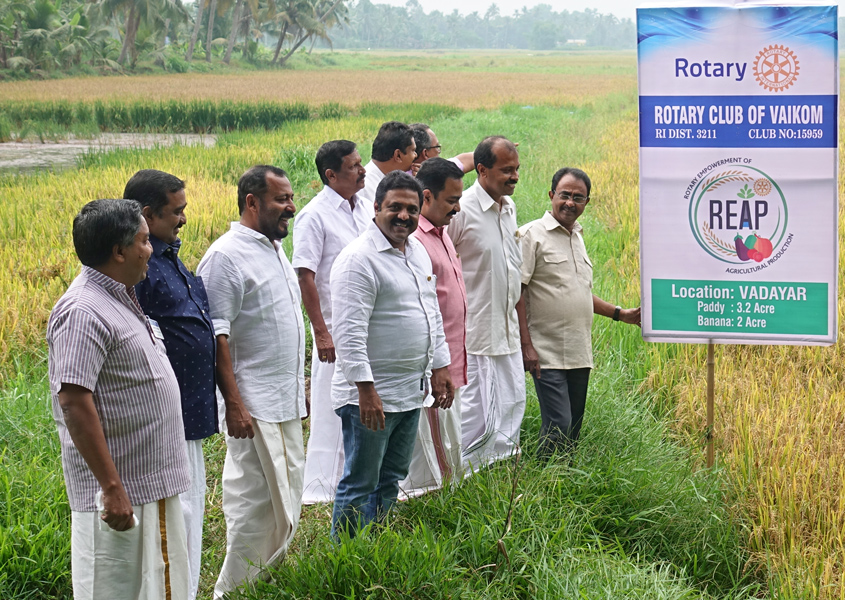
An interesting aside to this is that a couple of months ago, when rice was harvested at one of the fields, one of the ministers invited for the utsav made a telling comment “in front of the TV channels. He said when the programme was launched, he didn’t think Rotarians will be able to do this work and was both surprised and happy that we have taken this project so far. ‘I now realise Rotarians are good people who are trying to change the mindset of the community,’ he said,” smiles Kurien. At another meeting the Rotarians presented another minister with REAP rice. He tried it and liked it so much that he has asked for more!
DG Mathew adds that at any Rotary event the REAP rice stall is the most popular and is the first to finish all stocks.
Swaying green fields
When I visit the first field at Vaikom, about 52 km from Kochi, where 3.5 acres have been leased by RC Vaikom, it is a cloudy day with excellent weather; a gentle breeze is blowing and the lush green paddy fields attract a swarm of birds, particularly the egrets. RC Vaikom President Shuja Matthew and Assistant Governor of the zone Shine Kumar explain that here the club has leased the field from a local farmer. The land had been kept idle for decades and now has started yielding two tonnes of rice per acre. Kumar explains that Vaikom is basically an agricultural area and has no heavy industries, the only notable one being Hindustan Newsprint. Adds the president, “There is 270 sq km of agri dominated land here but due to lack of labourers, climate changes and the ill-effects of chemical pesticides, none was interested in cultivating the land, till we came in.”
His club has 42 members and all of them are actively involved in this project, along with their families. It has almost become a rule with many clubs — of the 130 clubs in D 3211, 60 clubs are now involved in the REAP project — that they frequently organise their club meetings in the green environs of the paddy fields they are cultivating. There is no alcohol served at these meetings and the food is traditional Kerala food.
During events such as sowing, harvesting or infusing the soil with natural ingredients such as natural manure, neem paste, neem pesticides etc, which are scattered on the fields, the Rotarians make it a point to wear only traditional clothes; the trousers or jeans are exchanged for veshtis and lungis. “When this happens, the workers and the local villagers are happy to join us and ask about the project, because they feel that these guys might travel by Mercs and BMWs, but they are people like us,” says REAP Chair Kurien.
Shine Kumar adds that even those clubs which do not have land to lease and cultivate as they are city-based clubs, “are encouraged to partner with clubs doing this project”.
We next drive to the paddy fields leased by RC Thalaolaparambu, which has 21 members and has leased 5.3 acres of land. The land is green and the air fresh and the harvest is due in a few days. “Had you come here two months back you would have found it like a jungle filled with snakes. But we have made it a green paradise with support from farmers and labourers,” says Club President Shijo.
A nearby canal brings water to the fields and the club has distributed 1,000 grow bags to the local community to cultivate vegetables. This was done through schools to sensitise the youngsters on the importance of natural farming. Tapioca and bananas are also grown on this land, he adds.
Inclusive, with partnerships
REAP’s success can be attributed to its inclusive approach and partnerships. I meet at this village the local panchayat president V G Mohan, who says it is “always good to partner with Rotary. Thanks to their initiative, local people are getting jobs and more important, good healthy food.”
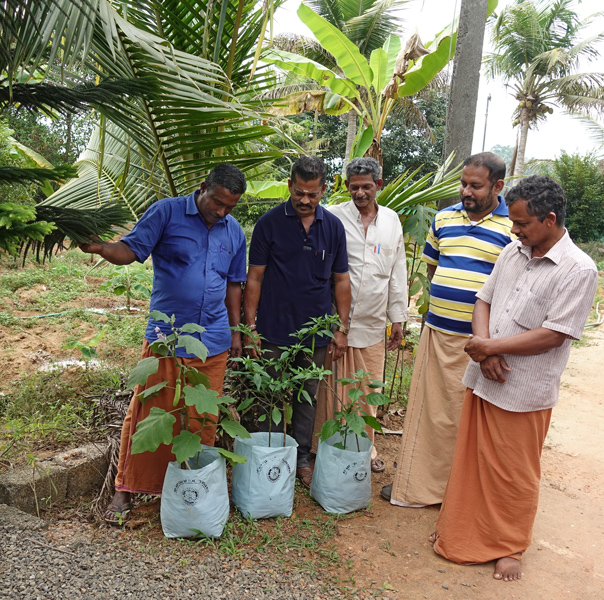
The other major spin-off from this greening project is the recharging of groundwater. Not only are the wells filling up but there is also some reversal of saline water turning sweet again. Though this region has a lot of water, the problem was drinking water, but that is slowly getting solved, he says.
Kurien adds that one of the Rotarians has started cultivation of 8,500 banana plants through natural farming. He explains that each of the paddy fields leased has a partnership with a local entity. “We have tried very hard to shake off the five-star image of Rotary through REAP, which is also a branding exercise, and now the Rotary logo is well-known in the communities where we have distributed grow bags or are cultivating paddy.”
Clean, green, natural
Clean, green, natural, organic… these are the four words I hear constantly. The next day I visit two more paddy fields in Thiruvalla, about 40 km from Kumarakom and where Rotarians have leased 11 acres of land for paddy growing. DG Mathew has joined the Rotarians in inspecting this project. The Rotarians are dressed in shirts and veshtis/lungis and the accompanying Rotary Anns are armed with colourful umbrellas.
Club President Mathews K Jacob has come with several of his club members for the field meeting. Rtn Harikrishnan, the coordinator of the project, explains the club has leased the 11 acres from a temple. Omana Kumar, a farmer and technical adviser, explains about the special breed of seeds which he is developing and Chellappan, a labourer, is all smiles as he serves delicious coconut water to us.
Around a dozen women labourers are engaged in a de-weeding operation and their mellifluous notes flow across the green fields. They are singing a folk song, which is praising the deity for giving a bountiful harvest. Here, the harvesting period is 120 days — in some fields it is only 90 days.
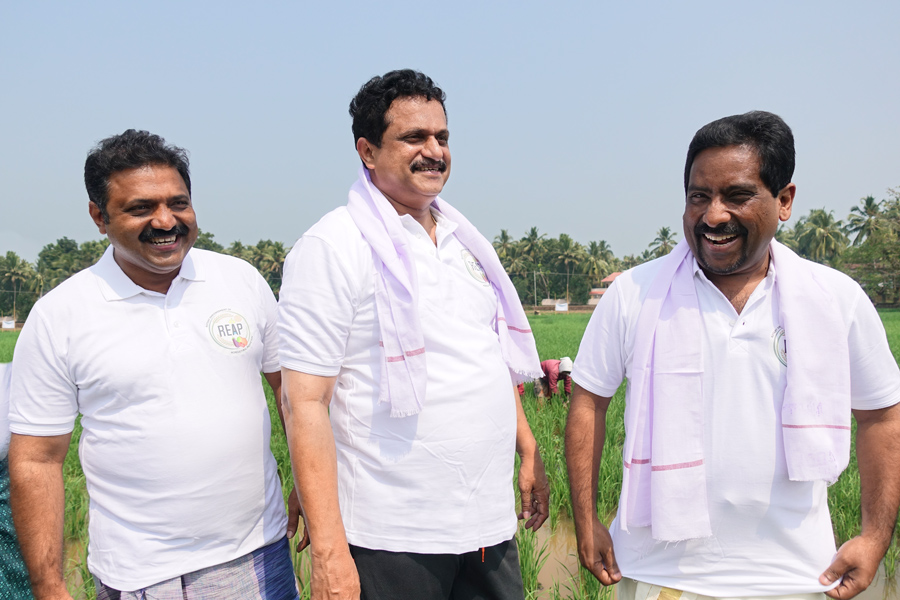
In a corner of the field are stacked a couple of plastic containers, filled with natural manure made from cow dung, cow urine and grains such as powdered rajma, peas and jaggery, to boost the crop. Harikrishnan explains the difference between natural and organic farming. “In natural farming, which we do here, we just culture the microorganisms and put them into the soil. That gives micro-nutrients and the much-needed immunity against diseases and pests to the crop.”
Also, he calls the manure a growth enhancer and not a fertiliser. “Subhash Palekar (agriculturist who propagated natural farming) never uses the word fertiliser; he always says you don’t have to interfere much into nature… the less interference the better for a more bountiful, quality yield. So this is one step above organic farming. We bring natural ecology into farming and are actually changing or reintroducing the original ecosystem.”
Adds DG Suresh Mathew, “This particular soil has now been converted and is free from chemical pesticides, which means new microorganisms are growing to enrich the land.”
₹10 to TRF
Mathew adds that seeing the immense popularity and demand for REAP rice, “we are going to increase the price from ₹50 to ₹60 a kg, and will give the additional ₹10 to TRF. I am also going to export one consignment of this rice to the US; since I am already in the frozen food export business, I already have a channel.”
We chat with the women who are singing as they are picking out weeds. Prasanna, who had earlier worked as a nurse in Jodhpur but had to return home as her two children were very young, speaks in fluent Hindi. She, along with the other workers, works from 8 am to 2 pm and gets a daily wage of ₹400. She is very happy that the REAP initiative gives her this income, which goes to supplement the money earned by her husband who runs a small paan shop. Thilagamma, a mother of three, and whose husband is a painter says, “Thanks to this work we get some additional income.” Kalyani, the leader who has taught them the folk song which weaves in many traditional tales, says this venture of the Rotarians has provided her the much-needed employment.
I put in my requisition for 1 kg of REAP rice and Kurien smiles, “You are going to taste it at lunch today.” We pile into Harikrishnan’s house for lunch; his wife is a doctor and at work. But under the expert guidance of his mother, other Rotary Anns have taken over the kitchen and the delicious, sumptuous meal they serve is among the best I’ve ever had. This region’s famous kari meen (pearl spot fish) has been prepared to a new perfection and the sambar and other vegetables served with the REAP rice, complete the meal. The rice is indeed delicious.
So have other districts replicated his dream project, I ask DG Mathew. “Not yet; but we have managed to inspire many other organisations in Kerala, as well as many panchayats, who are enthused that we use traditional seeds, instead of hybrid seeds, which we have brought from Wayanad and Palakkad.” And now, basmati rice seeds have been brought from Gujarat and that rice is also being cultivated, he adds. Also around 20 members from one Rotary club in UK, who were visiting a club in Kerala, were taken to the REAP rice fields. “On that day the paddy was being harvested and they were amazed and told us this is exactly the kind of project we would like to associate and partner with, so please send us more details,” adds Mathew.
Pictures by Rasheeda Bhagat
From lottery to Rotary
DG Suresh Mathew explains that the objective of the REAP project was primarily to convert fallow and chemical infested land into rich, fertile land infused with bio-nutrients and organic manure, but it was also to enhance Rotary’s public image.
For one, as in most places, in Kerala too, most people associate Rotary with an elitist organisation with wealthy members who meet and party in five-star hotels. “A lot of the serious welfare projects that we do are not noticed by the people. Actually in Kerala many people think of and refer to Rotary as lottery!”
The governor himself had a taste of this during a club visit the previous day. “Here, the government owns the Karunya Lottery, and it gives money for surgery to deserving people. Yesterday, during a club visit one winner came to the club for a recommendation letter because a government officer had asked for such a letter from the State Lottery department and she thought that meant a Rotary club,” laughs DG Mathew.
To say it loud and clear that Rotary is a service organisation which undertakes great initiatives for the community, each of the sowing and harvesting events is celebrated as an utsav by the club concerned. “In these events not only Rotarians and their families, but also the local villagers, farmers and farm labourers and panchayat representatives participate. And we insist that while visiting the rice fields for such events, Rotarians should wear a shirt and veshti and not trousers, so that we merge with the local community,” he adds.

